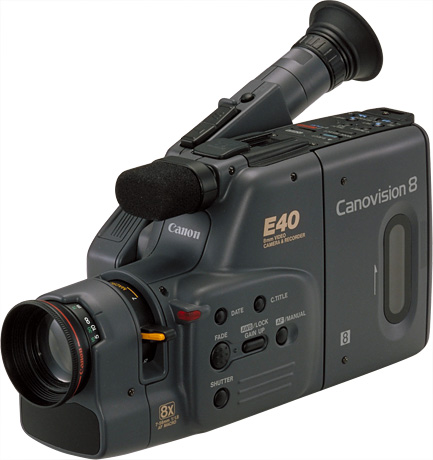- Outline
- Specifications
| Marketed | April 1991 |
| Original Price | For export only (no Japanese market price) |
The E40 was developed as the successor to the E50. It was marketed only in North America, retaining the basic features of E50 including easy operation, stable shooting, and high-quality image while adding enhanced features such as a cable-free video light and a title scroll.
| Video recording system | 2 rotary heads, helical scanning system (NTSC) – Luminance signal: FM azimuth recording – Chrominance signal: Converted subcarrier phase shift recording |
|
| Audio recording system | Frequency multiplexing system (Hi-Fi monaural) | |
| Television system | NTSC system | |
| Tape format | 8 videocassette | |
| Tape speed | 14.345mm/s | |
| Maximum recording time | 120 min. (with a 120-min. cassette) | |
| Fast forward/rewind time | Approx. 6 min. 30 sec. (with a 120-min. cassette) | |
| Image sensor | 1/3″ CCD (charge-coupled device), 270,000 pixels (250,000 effective pixels) | |
| Viewfinder | 0.6″ Monochrome electronic viewfinder | |
| Built-in microphone | Omnidirectional electret condenser microphone | |
| Lens | 7-56mm focal length, 12 groups 13 lenses, filter diameter: 37mm, P = 0.75, Minimum shooting distance: 60cm | |
| Focusing system | Active 3-point autofocus using infrared beam | |
| Minimum illumination | 25 lx | |
| Illumination range | 25 lx-100,000 lx | |
| Aperture | Auto iris servo system | |
| Output terminal (level/impedance) | Video/audio output terminal | RCA-pin jack |
| Video output terminal | 1Vp-p/75 ohms | |
| Audio output terminal | -10dBv (at 3 kohms load) | |
| Power supply | 6V DC | |
| Power consumption | indistinct (Forwarding) , 6.3W (AF mode) | |
| Operating temperature range | 32-104°F (0-40°c) | |
| Dimensions | Approx. 110mm x 125mm x 289mm (excluding tiny projection) | |
| Weight | Body: Approx. 940g When recording: indistinct |
|


